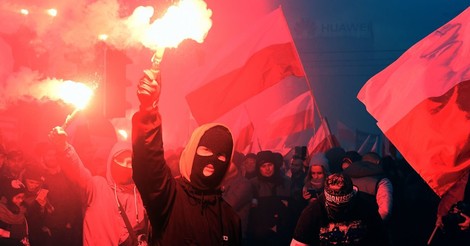Your podcast discovery platform
Curious minds select the most fascinating podcasts from around the world. Discover hand-piqd audio recommendations on your favorite topics.

piqer for: Globalization and politics Global finds
Sezin Öney, originally from Turkey, is based in Budapest and Istanbul. She her journalism career as a foreign news reporter in 1999 and she turned into political analysis as a columnist since 2007. Her interest in her main academic subject area of populism was sparked almost decade ago; and now she focuses specifically on populist leadership, and populism in Turkey and Hungary. She studied international relations, nationalism, international law, Jewish history, comparative politics and discourse analysis across Europe.
Poland: Authoritarian, Not Patriotic
On November 11, 2017, the Independence Day of Poland was celebrated in a rather "unique" way. Around 60,000 people marched in Warsaw at a Polish Independence Day celebration led by three radical-nationalist groups with some banners calling for “White Europe” and “Clean Blood”. Maciej Kisilowski, associate professor of law and public management at Central European University of Budapest, questions "how could Jarosław Kaczyński, Poland’s de facto leader, let the 'evil genie' of neo-Nazism and hateful nationalism 'out of the bottle'?" Kisilowski lists further:
Other policies pushed forward by the ruling Law and Justice party (PiS) have incited a similar mix of outrage and bewilderment. Why does Kaczyński not appear to worry that the judiciary he captured may one day be used against his own party? Is he not afraid that antagonizing Germany, a key NATO and EU ally, may eventually help Russian President Vladimir Putin? Is he not uneasy about increasing Poland’s economic vulnerability by lowering the retirement age and introducing massive new welfare spending?
He answers his own questions in a rather grim and pessimistic manner:
Unfortunately, Kaczyński’s aggressive short-termism is perfectly rational — if he intends to do away with Poland’s democracy altogether.
Kisilowski's argument is that the ruling Law and Justice party (PiS) is pursuing a conscious and systematic policy "dead set on building a state apparatus willing to do whatever it takes to protect the regime". And the term "regime" seems to be a euphemism for the Kaczyński rule. Kisilowski details the PiS strategy for grabbing the power by examples, and emphasizes that such moves will continue as long as Poland crashes into a wall.
This article on Politico has also a "twin" counterargument article titled; "Poland: Patriotic, not authoritarian", written by Tomasz Wroblewski, president of the Warsaw Enterprise Institute, arguing completely otherwise. Up to the reader and also, to history to decide.
Stay up to date – with a newsletter from your channel on Globalization and politics.
